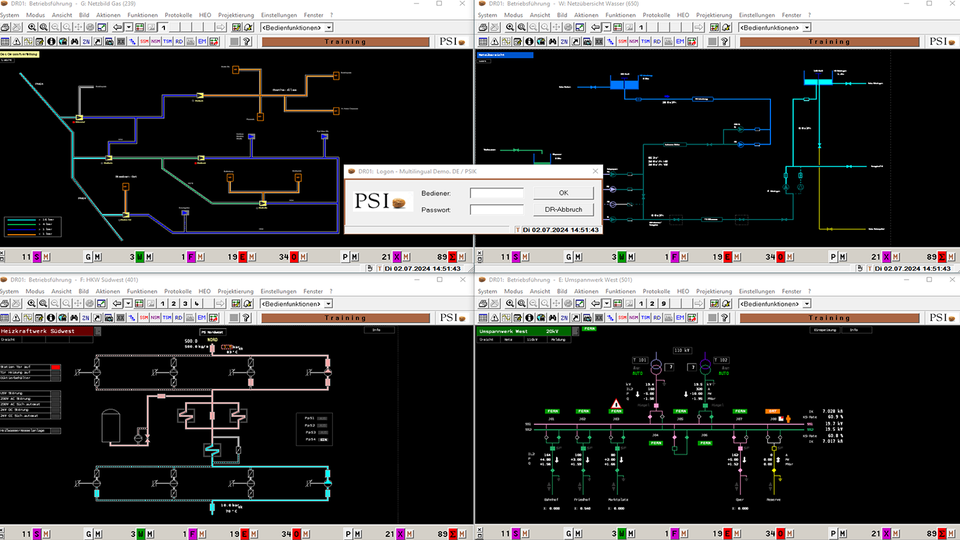
The energy transition marked the beginning of the ever faster changing energy supply. Control systems must keep pace with new standards and legal requirements, but also prevent cyber attacks. The PSIprins energy grid control system meets and exceeds all these requirements and offers all functions required for cost-optimized operation.
Benefits at a glance

-
Combined energies grid management PSIprins enables you to act rather than to react: it manages power and gas as well as district heating (in fact, all pipe-bound energies) across all sectors in a combined system.
-
Cost optimized operation PSIprins and its modules & services are highly standardized. The entire range of services is flexible, support multi-tenancy and is future-proof.
-
Scalability PSIprins' high scalability provides the tools required by grid operators to optimize networks independent of their size: from single commodity to complex segment-spanning operations.
-
High availability PSIprins is a high aivailable, flexible and user-friendly system. It contributes to the achievement of a secure power supply and network stability for meanwhile more than 100 customers.
-
Modular and expandable PSIprins is a modular system with optimal extensibility and expandability: Whether your problems include switching order management, redispatch 2.0, maintenance support or support in fault situations - PSIprins is the tool of choice.
Modules
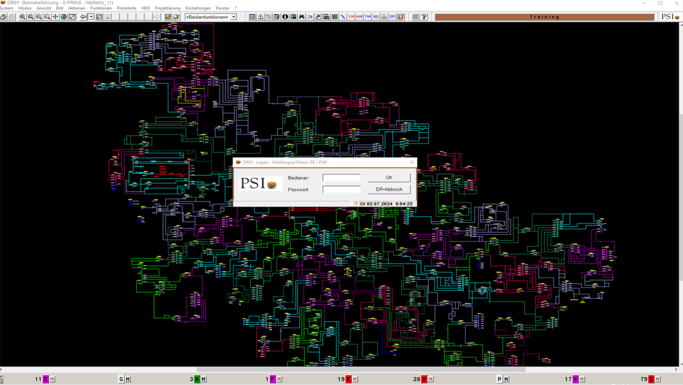
Basic SCADA software
The SCADA module is the basis of any modern grid control system. It provides all functions required for monitoring and controlling the distributed utility infrastructure. It supports high and medium-voltage grids, gas, water and district heating networks. The system can serve either as a single commodity or as a combined energies control system for regional and municipal utilities, industry as well as airports.
-
Redundancy
Redundancy is fully supported and includes geospatially redundant telecontol servers and process data handling
-
Operation and authorization concept
PSIprins offers a user-friendly multi-screen operation and multi-factor authorization concept
-
Data model input
PSIprins supports manual data input as well as imports using standard formats and connectivity data
-
Information processing
PSIprins supports processing of events, analog and metered data as well as virtual data points
-
Event, alarm and fault handling
PSIprins offers chronological logs, alarm summaries, notebooks, image tagging and more
-
Historical data
PSIprins includes repositories for analog and metered data, supports export/ import of data, backup processes as well as graphical and tabular displays
-
Higher functions for operations
PSIprins offers study mode, fault analysis and service restoration, test operation, switching lists and sequences
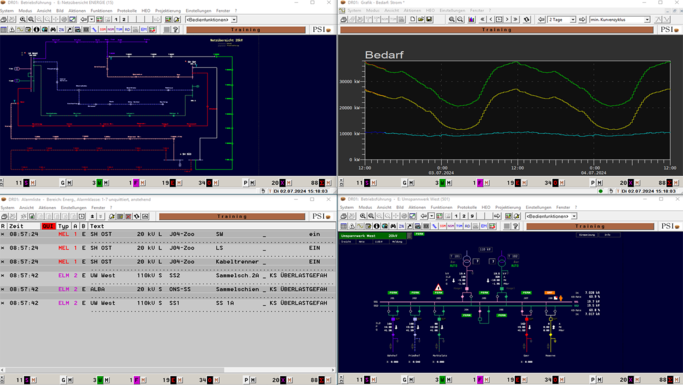
Power
Monitoring and control of power systems
-
Basic functions power
Connectivity analysis, grid coloring as well as interlock checks before switching operations
-
Power demand forecast
Forecast of demand including utilization and shutdown planning
-
Demand response optimization
Monitoring of power supply and network transaction contracts
-
In-feed management
Optimal integration of DER and CHP plants into the power grid
-
Load shedding and load management
Reduction of loads as part of the operational cascade
-
Switching order management
Coordination and planning of switching operations
-
Permit to work
Responsibility for asset components is handed over to the personnel on site
-
Temporary equipment
Temporary changes of network topology in operations management
-
Fault report
Preparation of fault reports as basis for BNetzA/FNN reporting (German rules)
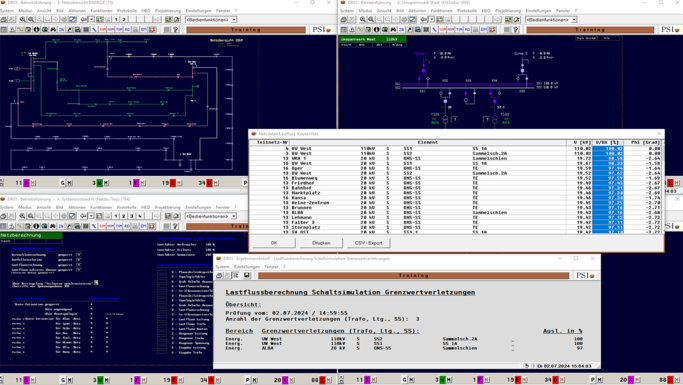
Power applications
Comprehensive functions for calculation and simulation support assessing the grid status and determining the fault location, supporting fault isolation and service restoration.
-
Load flow calculation
Steady state calculations and graphic visualization
-
State estimation
State estimation determines a consistent grid status and identifies bad data.
-
Contingency analysis
Determines the impact that a loss of a power line or transformer has on the grid.
-
Short circuit calculation
Calculation of short-circuit currents according to DIN EN 60909 VDE 0102.
-
Fault location
Searching for earth fault and short-circuits in distribution networks
-
Fault localization and service restoration
Localization the faulty equipment enables fast service restoration.
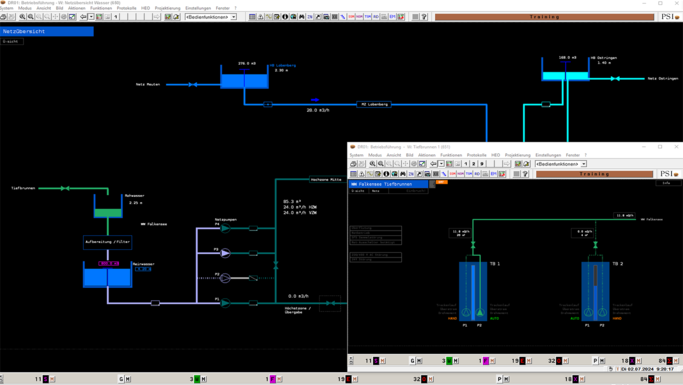
Water / wastewater
Monitoring and control of equipment, plants and pipe networks in the water sector. Data points and, if applicable, images can be assigned to a single operating area, e.g. "water", or several operating areas, such as "drinking water" and "waste water".
-
Topology
According to altitude levels or economic zones
-
Leakage detection
Monitoring the pipe network for leaks
-
Forecast of water demand
Consideration of weather-dependent demand, demand profiles and schedules
-
Water planning
Tank management plans delivery and tank levels in the future
-
Water control
Control in accordance to schedules or filling setpoint curves
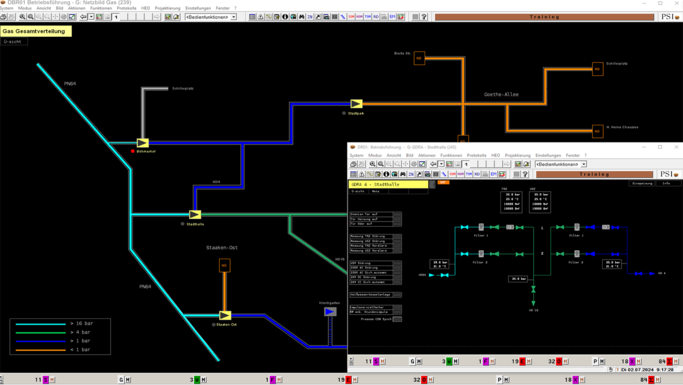
Gas
Monitoring and control of equipment, plants and pipe networks in the gas sector
-
Topology
Color coding of plants and networks according to supply status and pressure zones
-
Forecast of gas demand
Forecast of heating and industrial gas demand
-
Gas load distribution
Support supply planning for the gas year and reduce supply costs
-
Gas supply quantity control
Target hourly values for gas procurement, gas storage extraction as well as storage filling
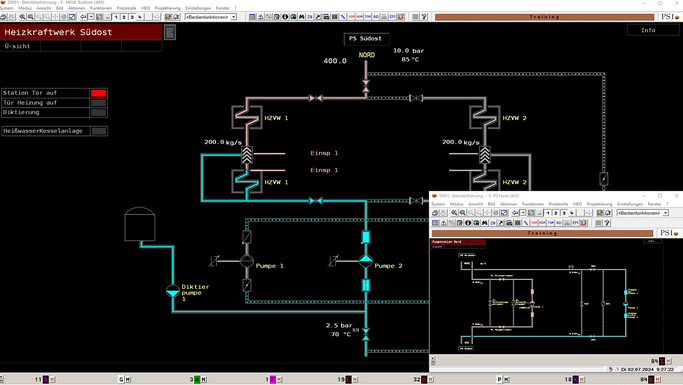
District heating
Monitoring and control of equipment, plants and pipe networks in the district heating sector
-
Topology
According to dictation, mass flow, temperature and supply zones
-
Forecast of district heating demand forecast
Consideration of weather-dependent demand, load profiles and schedules
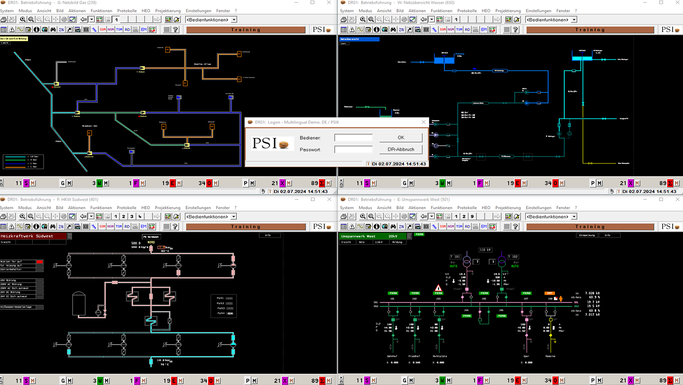
Extensions
The modules can be expanded with the following comprehensive functions and, if required, connected to third-party software.
-
Multi-tenant capability
Operational management for several tenants
-
Training simulator
Simulate events using training scenarios.
-
Log generation
External evaluation and visualization of historicaldata.
-
Web interfaces
Read-only web based access to system images and archives.
-
Automatic image generation
Creation of grid overview images as schematic or georeferenced images.
-
Geo-referenced grid images
Geo-referenced grid images and grid topologies based in GIS system datas.
-
Geo-redundancy
Geospacially distributed system connected by wide area network.
-
Interface for data integration
Data exchange with control system-related enterprise applications.
-
TASE.2 / IEC 60870-6
Data exchange between control centers.
-
System monitoring
Monitoring of servers, network and telecontrol systems.
-
Switching reports
Extended use of freely definable switching sequences.
-
Extensions of the telecontrol connection
IEC 104/101, IEC 61850, OPC DA, Modbus, SNMP, BACnet und DNP3
-
Process monitoring
Monitoring of protocol traffic and online configuration of channels
Typical users

Operations manager
Operation managers are using PSIprins to increase the security of supply and to keep an overview of the status of the energy networks at all times. In the event of faults, e.g. if lines are severed during construction work or after severe weather conditions, they are optimally supported in the restoration of supplies thanks to fault localization. Even from outside the control room, the operations manager always has an up-to-date picture of the situation via read-only web access. Intelligent functions support him in making the operating processes as smooth as possible.
-
High security of supply
PSIprins provides support through training, simulation and fault clearance functions.
-
Alway informed
Network information is available across all divisions - anytime and anywhere.
-
Everything documented
Comprehensive archive and reporting functions make the work of the operations manager .easier
FAQs
What does the PSIprins roadmap look like?
The development roadmap for the PSIprins product includes both, functional and non-functional enhancements.
The functional enhancements include extended network calculation functions, improved reactive power and load management in medium-voltage grids, expansion options in relation to §14a and the integration of artificial intelligence for operational management.
The non-functional enhancements include the ongoing expansion of PSIprins Security Services and the renewal of the user interfaces.
Which quantity structures will be supportable by using PSIprins?
PSIprins systems manage cross-sector networks for electricity, gas, water and wastewater as well as district heating in individual installations with over 2 million households supplied.
However, the compact systems of PSIprins also allow economical operations management for customers with only 1 division and less than 10,000 households supplied.


